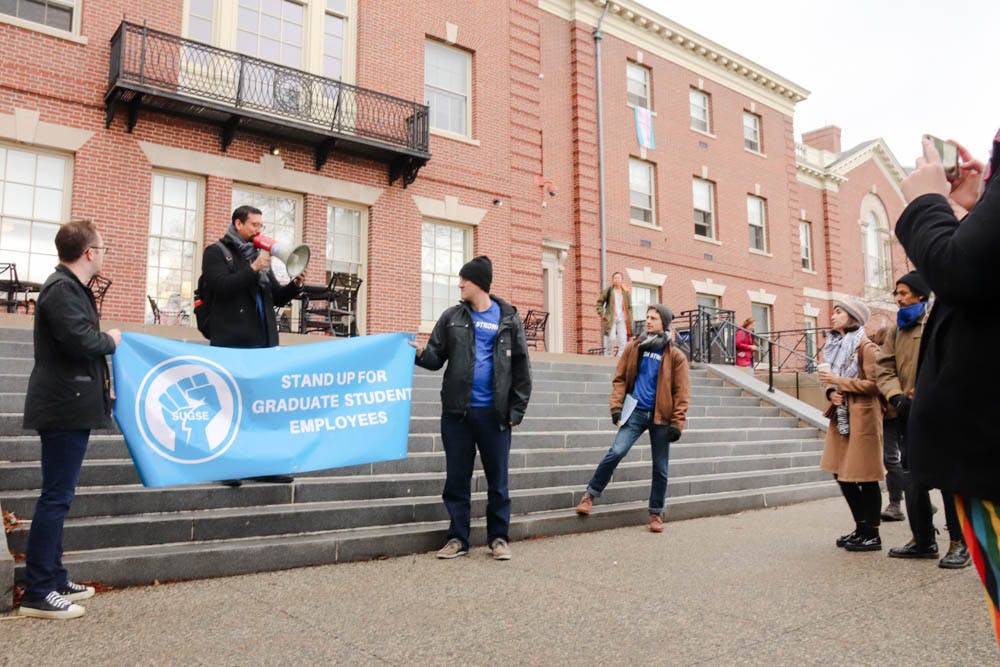Graduate students rallied on the steps of the Stephen Robert ’62 Campus Center Tuesday to reiterate demands for a union contract that would improve benefits for graduate student workers before delivering a book of letters from community members to the office of President Christina Paxson P’19.
Tuesday marked one year since University graduate students voted to unionize. Since then, the union, known as Stand Up for Graduate Student Employees, has started negotiations with the University toward a collective bargaining agreement with aid from the American Federation of Teachers, its union affiliate.
“Today, we are negotiating with the administration to have a contract that respects our work, that gives us living wages, health care that meets the needs of a diverse community (and) respect for conditions of work that we face every day,” said Jeffrey Feldman GS in his introduction at the rally.
Assistant Vice President for News and Editorial Development Brian Clark wrote in an email to The Herald that the University and SUGSE “have reached tentative agreements on a number of provisions important both to graduate students and to the University. On other topics, we continue to negotiate vigorously and in good faith.”
Earlier this fall, graduate students protested a proposed measure from the National Labor Relations Board that would exclude graduate students from classification as employees of their universities, The Herald previously reported.
By the start of the rally, SUGSE had collected over 275 letters of support from University community members, including graduate and undergraduate students, parents, faculty and staff, according to Audrey Massmann GS.
Massmann read various letters speaking to the value of graduate students not only in their fields of study but also in the University community at large. Describing her own experience in the field of ecology and evolutionary biology, Massmann emphasized that “graduate women at Brown should not have to choose between a career in science and motherhood.” In addition, she said graduate students should be able to pursue harassment complaints outside of the University’s Title IX office.
Attendees of the rally heard testimonials from various graduate students, who shared how they have been personally affected by a lack of contractually regulated working conditions.
David Herrera GS, a graduate student in the department of political science, entered the University with three pre-existing medical conditions and was recently diagnosed with sleep apnea, the bills for which have posed a significant financial burden for him. Herrera said that “better pay and better medical insurance” on the part of the University would empower graduate students to prioritize their health.
Babak Hemmatian GS, a fifth-year PhD candidate in the department of cognitive, linguistic and psychological sciences, has “done all of the different kinds of work that make Brown a leading educational and research institution,” he said. “My passion doesn’t devalue my labor.”
Melody Chapin GS of the department of music said that though she was initially impressed by the University’s health care coverage for graduate students, after just one year she was given “three weeks of turnaround time and fair warning to scramble and figure out what my new situation would be when Brown suddenly … decided to change (its) provider.” Chapin struggled to balance the mounting pressures that came with being a second-year graduate student while also finding sufficient health care coverage to insure that she would be able to receive insulin, which she depends on as a type 1 diabetes patient.
Following the student speeches, the crowd of rally attendees marched into University Hall repeatedly chanting the word “contract” as they approached Paxson’s office to deliver the letters.





